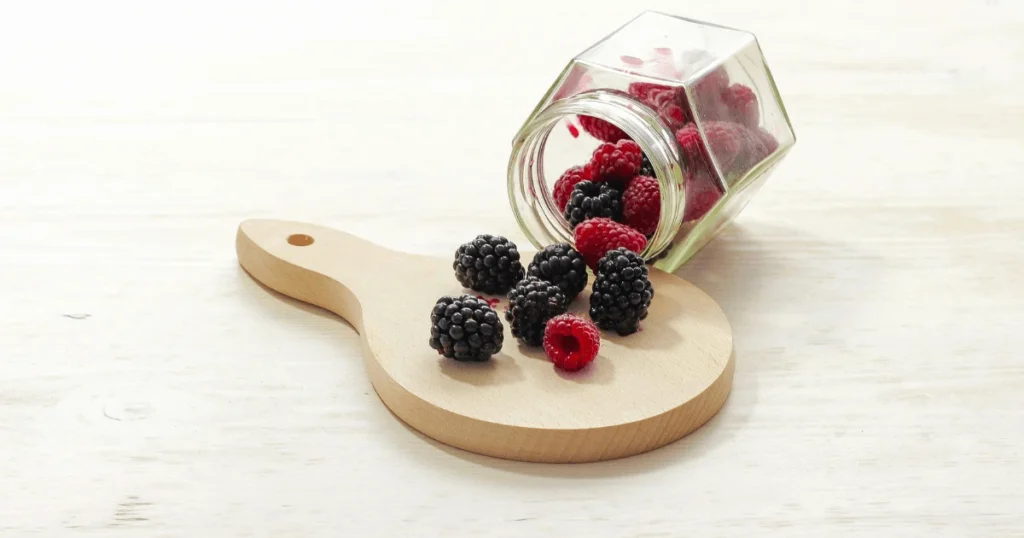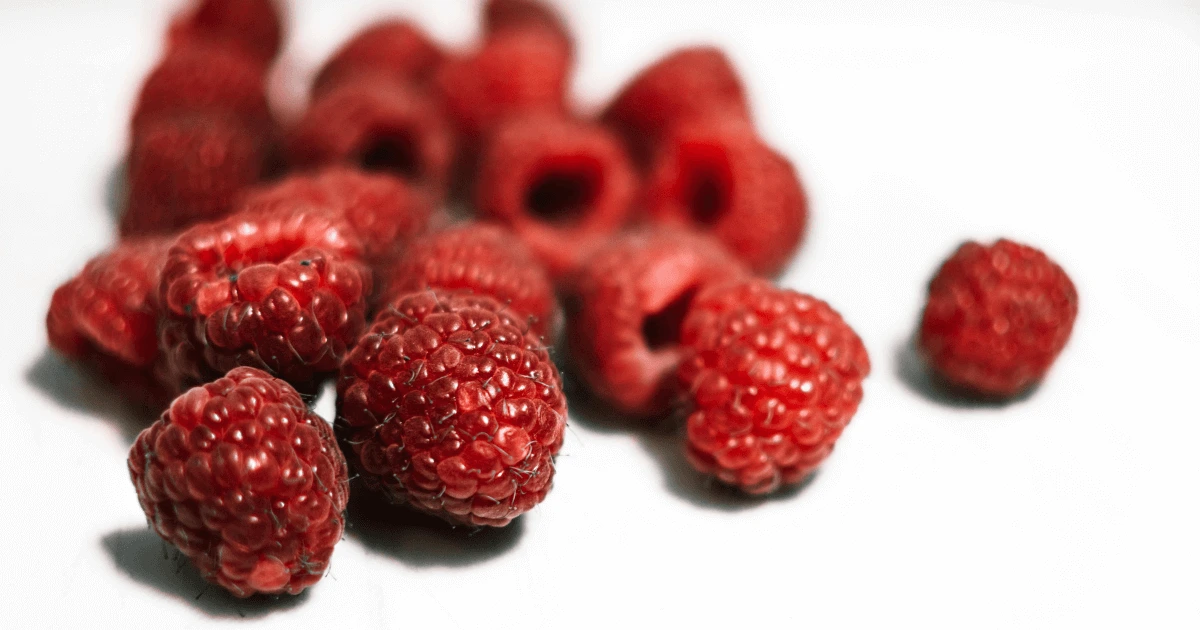7 Essential Facts: Can Dogs Eat Raspberries Safely?
Table of Contents
Introduction:
You’re slicing fresh raspberries for your smoothie when those puppy-dog eyes lock onto you — tail wagging, nose twitching, silently asking, “Can I have one?”
The short answer? Yes, dogs can eat raspberries — but before you toss a few their way, there’s a berry-long list of things you need to know.
Sure, they’re small, sweet, and antioxidant-rich, but hidden inside that juicy red bite is a natural compound that could spell trouble in large amounts. From health benefits to hidden risks, this guide breaks down everything you need to know — straight from vet-backed sources and pet nutrition pros.
Let’s get into the 7 essential facts that answer the big question:
Can dogs eat raspberries safely?
Yes, Dogs Can Eat Raspberries — But in Moderation Only
Let’s start with the good news: raspberries are non-toxic to dogs and can even deliver a handful of health perks. But — and it’s a big “but” — moderation isn’t just recommended, it’s critical.
Raspberries contain a natural sweetener called xylitol, which is highly toxic to dogs in large amounts. The small quantities in raspberries usually aren’t dangerous, but if your pup scarfs down a bowlful, you might be headed for a vet visit.
🔍 Quick tip:
Limit your dog to a few raspberries at a time — think 5–10 max, depending on size. For smaller breeds, even fewer.
👉 Next up: why raspberries could be your dog’s secret weapon for joint health…
Packed with Benefits: Why Raspberries Can Be Good for Dogs

Yes, can dogs eat raspberries? They absolutely can — and not just because they’re juicy and sweet. Raspberries (red or black) are loaded with nutrients that can do wonders for your pup’s health. But remember, the key is moderation.
🍇 Can Dogs Eat Red Raspberries?
Red raspberries are rich in powerful antioxidants, fiber, and essential vitamins. For aging dogs, the antioxidants may help reduce inflammation and joint stiffness — a secret weapon for more wag and less ache.
🫐 Can Dogs Eat Black Raspberries?
Yes, dogs can eat black raspberries too — just keep it minimal. They’re slightly higher in natural xylitol than red raspberries, so only serve a few at a time. But when handled right, they offer similar health perks like boosting immunity and digestion.
Here’s what makes both types of raspberries a smart, clean treat:
Antioxidants
Raspberries are high in antioxidants, which help neutralize free radicals in the body, lowering cell damage, inflammation, and indications of aging. For senior dogs, this could mean less joint pain and improved mobility.
Fiber
Dietary fiber supports healthy digestion and helps your dog feel full longer. That makes raspberries a smart option for weight-conscious canines who beg between meals.
Vitamins & Minerals
We’re talking Vitamin C, Vitamin K, manganese, copper, magnesium, folic acid, and more. These micronutrients support immune function, bone health, and energy levels — even in small amounts.
Low in Sugar and Calories
Compared to processed dog treats or other fruits, raspberries are refreshingly light. No sugar overload here — just a crisp, clean snack that’s easy on the waistline.
📌 Bottom line:
Raspberries aren’t just safe — when fed responsibly, they can actually boost your dog’s health.
How to Feed Raspberries to Your Dog Safely
Here’s where things get real: Just because the answer to “can dogs eat raspberries” is yes, doesn’t mean they should eat them in any form or amountLike all treats, how you serve them matters.
Here’s your go-to safety guide:
✅ Wash and Serve Fresh
Rinse raspberries thoroughly to remove any traces of pesticides or bacteria. Organic is ideal, but a good wash under cold water does the trick.
✅ Go Easy on the Quantity
Think about raspberries as a garnish. not a meal. Stick to:
- 5–10 raspberries for medium to large dogs
- 2–4 raspberries for small breeds
Feed just a few times a week, not daily.
✅ Try Them Mashed or Frozen
Mash berries into your dog’s food or serve frozen on a hot day. Either way, it’s a textural treat that adds a little zing to mealtime.
✅ Avoid These Mistakes:
- ❌ No canned, candied, or sweetened raspberries — they’re sugar bombs.
- ❌ Skip anything raspberry-flavored — that stuff’s made for humans, not hounds.
- ❌ Don’t feed spoiled or unripe fruit. Your dog deserves better.
⚠️ Pro Tip: For senior pups or small breeds, mash the berries to reduce choking risks.
Risks and Warnings Every Dog Owner Should Know
As sweet as raspberries seem, not everything about them is puppy-perfect. Beneath that ruby red glow lie a few risks you definitely want to keep on your radar — whether you’re wondering “can dogs eat raspberry” treats in general, or you’re serving specific types like red or black.
Natural Xylitol Content
Here’s the big one: raspberries naturally contain xylitol — the same sugar substitute found in some chewing gums and sugar-free snacks that’s toxic to dogs in large quantities.
The good news?
The xylitol in raspberries is only present in small amounts. So yes, dogs can eat raspberries — but overdoing it, even with black raspberries, can be risky. Stick to small, infrequent servings.
Digestive Drama
Too many berries can cause:
- Vomiting
- Diarrhea
- Gas
- Constipation
Even healthy fruits like red raspberries or strawberries can trigger an upset tummy when not served with care.
😮 Choking Hazards for Small or Senior Dogs
Even soft berries like raspberries or strawberries can become a choking risk if swallowed whole — especially for toy breeds or elderly pups.
Allergic Reactions: Rare but Real
Watch for vomiting, itching, swelling, or discomfort if your dog is eating raspberries — whether they’re black raspberries, red, or a bit of strawberry on the side.
🚨 Notice anything weird? Stop feeding and call your vet.
When You Shouldn’t Feed Your Dog Raspberries
Sometimes, the best treat is no treat at all. Even if you’ve read that dogs can eat black raspberries, red raspberries, or even the occasional strawberry, not every pup will tolerate them the same.
Dogs with Diabetes
Despite being low in sugar, raspberries and strawberries still contain natural fruit sugars that could affect blood glucose. If your dog is diabetic or insulin-dependent, skip them unless your vet gives the go-ahead.
Dogs with Food Sensitivities or Allergies
Whether you’re testing if dogs can eat raspberry safely or offering a piece of strawberry, go slow. Dogs prone to digestive issues may react badly to even the cleanest fruit snack.
Dogs on Prescription or Limited Diets
If your dog is recovering from illness or under vet-supervised nutrition, introducing fruits like red raspberries or strawberries might interfere with their balance. When in doubt, wait it out.
💡 Pro tip: Curious if dogs can have strawberry as an alternative to raspberries? They can — but just like raspberries, moderation is everything.
Quick Reference Table: Raspberry Safety by Type
Not all raspberries (or raspberry products) are created equal. Here’s a quick cheat sheet to help you decide what’s safe and what’s not when your dog’s staring you down at snack time:
| Raspberry Type | Safe for Dogs? | Notes |
|---|---|---|
| Fresh red raspberries | ✅ Yes, in moderation | Wash thoroughly, serve plain. Ideal for most dogs. |
| Frozen raspberries | ✅ Yes, in moderation | Great summer snack. No added sugar or syrup. |
| Black raspberries | ✅ Yes, small amounts | Still safe, but watch portion size due to xylitol. |
| Dried or sweetened berries | ❌ Not recommended | High sugar, preservatives, potential choking risk. |
| Raspberry-flavored treats | ❌ No | May contain artificial sweeteners/toxins. Avoid. |
| Raspberry jam/jelly | ❌ No | Too much sugar, potential xylitol danger. |
📝 Reminder: Whether it’s red raspberries or black raspberries, keep portions small and occasional. When you’re asking yourself “Can dogs eat black raspberries?” or “Can dog eat raspberry in any form?” — the safest answer is: plain, fresh, and in moderation.
Expert Tips for Feeding Raspberries (and Other Fruits)
Ready to introduce berries into your dog’s life? Here are some bite-sized rules that apply to raspberries, strawberries, and beyond:
✔️ Follow the 10% Rule
Treats — including fruits — should never exceed 10% of your dog’s daily calorie intake.
✔️ Always Introduce Slowly
Trying out a new fruit? Whether it’s the first raspberry or a single strawberry, start with one small piece and observe.
✔️ Avoid Fruit Mixes
Don’t mix raspberries with other new fruits (like blackberries, strawberries, or blueberries) in the same serving. If your dog reacts poorly, you won’t know the culprit.
✔️ Watch the Source
Stick with fresh or frozen fruits. Avoid canned, processed, or artificially flavored options — especially those labeled “no sugar added” (hello, hidden xylitol!).
🔁 Considering switching it up? Wondering, Can dogs eat strawberries instead of raspberries? Yes — strawberries are also dog-friendly, but they come with the same moderation rules.
Frequently Asked Questions
1. Can dogs eat raspberries every day?
Not recommended. While dogs can eat raspberries, they should only have them occasionally — a few berries 1–2 times a week is plenty. Too many can lead to stomach upset or xylitol buildup.
2. Can dogs eat black raspberries safely?
Yes, dogs can eat black raspberries in moderation. They contain antioxidants like red raspberries but have slightly more natural xylitol, so feed sparingly — 2–4 berries max for smaller dogs.
3. Can dogs eat red raspberries instead of treats?
Absolutely! Red raspberries can be a low-calorie, high-fiber snack option to replace processed treats. Just make sure they’re fresh, clean, and served in small amounts.
4. Can dogs have strawberries instead of raspberries?
Yes, dogs can have strawberries too! Both strawberries and raspberries are dog-safe fruits when served fresh and in moderation. Always remove the stem and cut into bite-sized pieces.
5. Can dogs eat raspberry jam or canned raspberries?
No. Avoid raspberry jams, jellies, or canned raspberries, as they often contain added sugar, artificial sweeteners (like xylitol), and preservatives — all of which are harmful to dogs.
6. What’s the safe serving size of raspberries for dogs?
For small dogs: 2–4 raspberries
For medium dogs: 5–7 raspberries
For large dogs: up to 10 raspberries
Always supervise and start with less if it’s their first time.
Final Bark: Can Dogs Eat Raspberries Safely?
So, let’s wrap it all up. Can dogs eat raspberries? Absolutely — as long as you keep it simple, small, and occasional.
Raspberries (red or black) can offer vitamins, fiber, antioxidants, and flavor. But they also contain natural xylitol, and too many can upset your dog’s stomach. That’s why you need to go slow, observe, and never turn berries into a daily snack.
Thinking of adding more fruity flair? You can also safely explore options like strawberries, just remember: not every fruit is dog-approved, and moderation rules the bowl.
🍓 In summary:
Whether you’re asking can dog eat raspberry, can dogs eat black raspberries, or can dogs have strawberry — the answer is yes, with careful prep and portion control. Always consult your vet before making any treat a routine.

